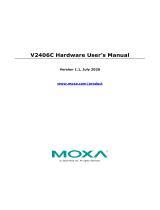
- 7 -
SIM Card Socket
The UC-3100 comes with two nano-SIM card sockets for cellular
communication. The nano-SIM card sockets are located on the same side
as the antenna panel. To install the cards, remove the screw and the
protection cover to access the sockets, and then insert the nano-SIM
cards into the sockets directly. You will hear a click when the cards are in
place. The left socket is for SIM 1 and the right socket is for SIM 2. To
remove the cards, push the cards in before releasing them.
SMA Connector
The UC-3100 comes with a built-in wireless module. You must connect
the antenna to the SMA connector before you can use the wireless
function (refer to datasheet for more information). The C1 & C2
connectors are interfaces to the cellular module, W1 & W2 (UC-3111 &
UC-3121 only) are interfaces to the Wi-Fi module.
SD Card Socket (UC-3111 Only)
The UC-3111 comes with a SD-card socket for storage expansion. The SD
card socket is located next to the Ethernet port. To install the SD card,
remove the screw and the protection cover to access the socket, and then
insert the SD card into the socket. You will hear a click when the card is in
place. To remove the card, push the card in before releasing it.
Console Port
The console port is an RS-232 port that you can connect to with a 4-pin
pin header cable (in the package). You can use this port for debugging or
firmware upgrade.
USB
The USB port is a type-A USB 2.0 version port, which can be connected
with a USB storage device or other type-A USB compatible devices.










